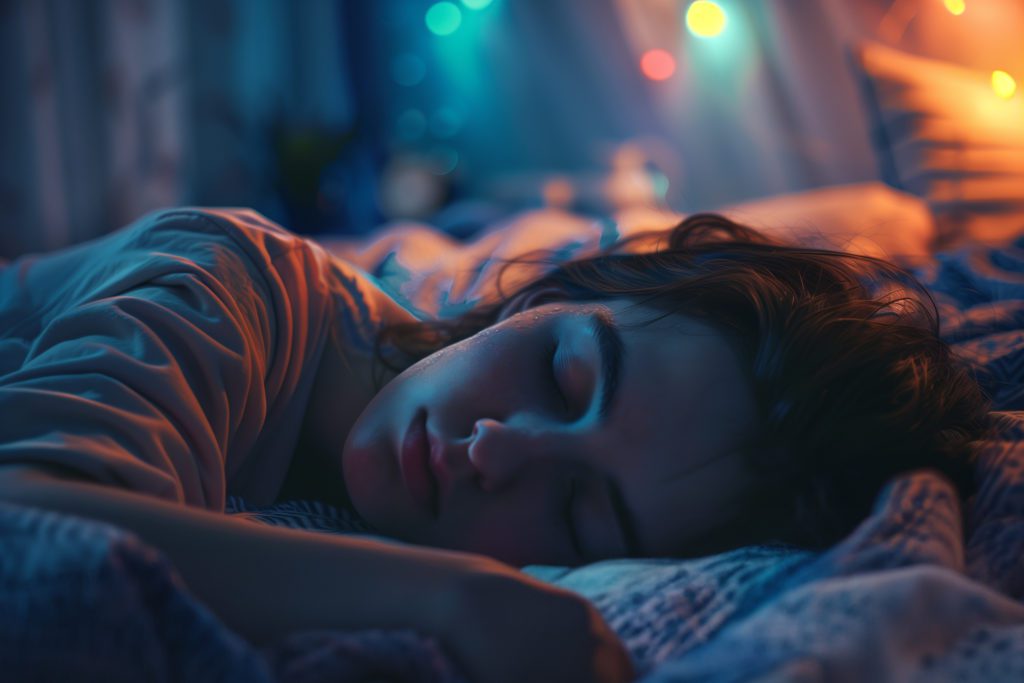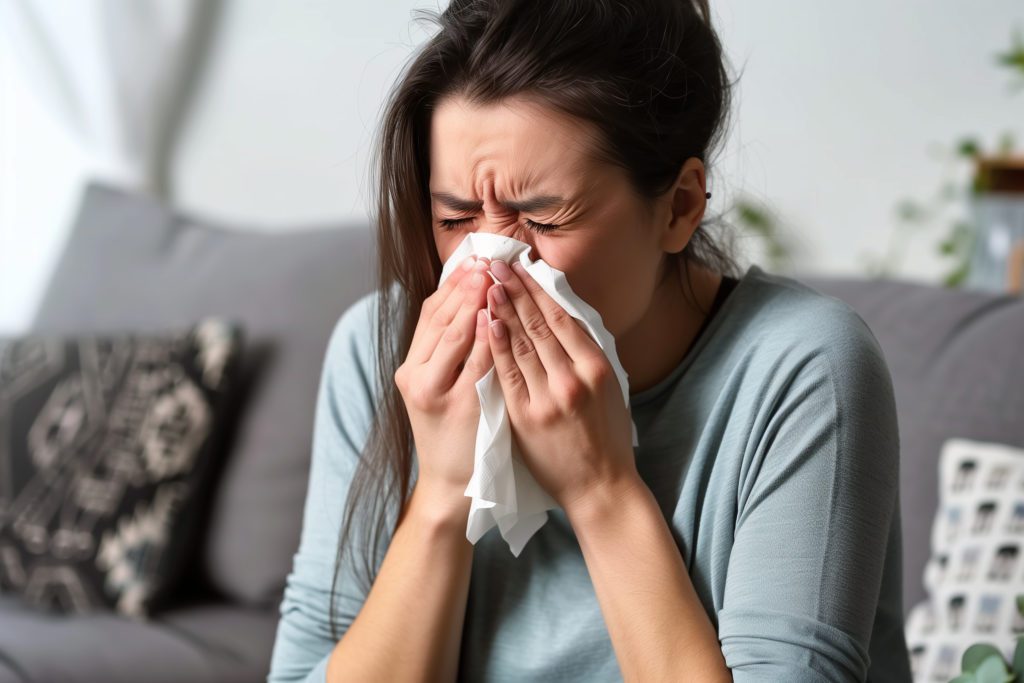
The Connection Between Summer Allergies and Sleep Disruptions
Summer allergies can cause sneezing, coughing, itching, and congestion. Explore how this can affect your sleep and see tips for combatting it.

When the weather gets warmer and the days get longer, summer allergies can also enter into full swing, leaving you sneezing, itchy- and watery-eyed, and congested all day and night from June to September.
Not only can these symptoms make your days unpleasant, but they can make falling and staying asleep nearly impossible. You may find yourself too congested to breathe easily at night or wake up during the night with an itchy nose. In fact, research shows that those with allergies are more than twice as likely to have insomnia, so this group understands the challenges of sleep all too well when allergen counts are high.
Let’s explore how summer allergies can affect your sleep and what you can do about it.
What Causes Summer Allergies?
There are two primary reasons why your allergy symptoms are so much worse during the summer months.
First, many common allergens are active this time of year, including:
- Grass pollen
- Tree pollen
- Mold
- Ragweed pollen
- Nettle
This means that the allergens are floating in the air, just waiting for you to interact with them, which brings us to the second cause: you’re spending more time outside.
When the weather is warm and the days are long, you’ll likely spend more time outside gardening, camping or hiking, entertaining in the backyard, or doing other outdoor activities. The more time you spend outside, though, the more exposure you get to allergens, which are also more active at this time. If your body is sensitive to them, this can cause an allergic reaction and the common symptoms of seasonal allergies.
How Do Allergies Affect Sleep?
Those with allergies are significantly more likely to suffer from the following sleep issues:
- Difficulty falling asleep
- Trouble staying asleep
- Increased snoring
- Poor sleep efficiency
- Increased risk for sleep apnea
- Short sleep duration
Why? It’s all because of the symptoms of allergies.
Take obstructive sleep apnea, which can result from difficulty breathing due to congestion, which can cause mouth breathing or otherwise obstruct your airways. The result is stopped breathing episodes during the night. Not only can this be dangerous for your health—with obstructive sleep apnea leading to weight gain, high blood pressure, and cardiovascular disease development—but it can also affect your sleep by continually waking you during the night, keeping you from achieving the restorative, deep sleep that your body needs.
Itching is another common symptom of allergies, which can be especially bothersome at night when you have nothing else to focus on. The itching may make it hard to fall asleep or wake you up, disrupting your sleep. To add to all this, scratching can lead to inflammation and swelling, making congestion worse and breathing even more difficult.
When you have allergies that impact your nights, this can also have daytime repercussions, such as difficulty waking up, morning headaches, daytime fatigue, and sinus pain.
How to Manage Summer Allergies
When your allergies make sleep hard to come by, the best way to improve your nights is by managing your allergies. Not only will this help you sleep better, but you’ll feel better all day, too.
Here are some ways to manage your summer allergies:
- Limit contact with outdoor allergens. If you don’t get exposed to it, your body won’t overreact to it; try to limit how often you go outside, especially when allergen counts are high, and avoid opening your windows, no matter how tempting the summer breeze may be.
- Check the allergy forecast. If you know what you’re allergic to, checking the allergy forecast can let you know when your specific allergen is high so that you know to stay inside.
- Cover up. Wear a face covering when gardening or mowing the lawn to keep pollen from getting into your mouth, nose, and eyes. If you have allergies prompted by physical contact, wear long sleeves and pants when working outside.
- Shower immediately. Once you come in from outside, hop into the shower. This can help you wash away any allergens lingering on your skin or hair, which can help stop an allergic reaction and the unpleasant symptoms that result.
- Take an antihistamine. Antihistamines can be found over the counter, and they work by stopping your body from producing histamine, which is the compound responsible for your allergy symptoms. If you have seasonal allergies, taking an antihistamine regularly can help prevent allergy symptoms from setting in.
As for improving your sleep when you have allergies, make these specific adjustments:
- Use an air purifier. Placing an air purifier in your room can help clear your bedroom of common household allergens, including mold, dust mites, and pollen brought in from outside.
- Take allergy medicine at night. Taking your allergy medicine at night allows a strong dose to be in your system overnight. However, check with your doctor first, especially if you take other medications.
- Avoid heavy drapes and upholstered furniture in the bedroom. These fabrics can easily collect dust and other allergens, which can make your bedroom a hotspot of allergens.
Along with these allergy-busting habits, maintaining healthy sleep habits is crucial as you return to a normal sleep routine. Keep your sleep schedule consistent, avoid alcohol and caffeine before bed, and keep your room quiet, dark, and cool.
Say Goodbye to Summer Allergies and Poor Sleep
Summer allergies can leave you sneezing, itching, coughing, and congested all day and night. When this starts to affect your sleep by keeping you from falling or staying asleep, you can feel the repercussions during the day with increased daytime sleepiness.
The key to improving your sleep even when summer allergies are in full swing is to limit your exposure to the allergens. Limiting your time outside (especially when the allergen counts are high), covering up, and changing your clothes or showering once inside can all go a long way in keeping your allergy symptoms at bay.
By managing your allergy symptoms, you can then focus on improving your sleep hygiene to rest easy during the allergy season.
FAQ
Can summer allergies cause daytime fatigue?
Yes, allergies cause fatigue by disrupting sleep with symptoms like congestion and itching, preventing deep rest. The immune system's response to allergens releases histamines, increasing inflammation and draining energy. Nasal congestion can lower oxygen levels, and some allergy medications cause drowsiness, worsening fatigue.
Are there specific foods that can worsen summer allergy symptoms?
Certain foods may exacerbate allergy symptoms due to cross-reactivity, where the immune system confuses proteins in foods with pollen. For example, individuals allergic to ragweed pollen might experience increased symptoms when consuming melons or bananas. This condition is known as oral allergy syndrome.
How do allergy medications impact sleep quality?
Some allergy medications, particularly first-generation antihistamines, can cause drowsiness, making it easier to sleep but potentially leading to grogginess the next day. Conversely, decongestants may cause insomnia or restlessness. It's essential to choose medications that address symptoms without adversely affecting sleep.
Can using an air purifier help reduce allergy-related sleep disruptions?
Yes, using an air purifier with a HEPA filter can help remove allergens like pollen, dust mites, and pet dander from the air, potentially reducing allergy symptoms and improving sleep quality. Maintaining clean indoor air is crucial for minimizing nighttime allergy disturbances.
Is it safe to exercise outdoors during high pollen counts?
Exercising outdoors during high pollen counts can exacerbate allergy symptoms. It's advisable to monitor pollen forecasts and choose times when counts are lower, such as late afternoon or after rain. Alternatively, indoor workouts can help avoid exposure to outdoor allergens.
How does nasal congestion from allergies lead to snoring or sleep apnea?
Nasal congestion from allergies can force individuals to breathe through their mouths during sleep, increasing the likelihood of snoring. Chronic congestion may also contribute to obstructive sleep apnea by causing airway obstruction, leading to interrupted breathing during sleep.
Are there natural remedies to alleviate allergy-induced sleep problems?
Natural remedies such as saline nasal rinsing can help clear nasal passages and relieve congestion, promoting better breathing during sleep. Additionally, maintaining a clean bedroom environment and minimizing allergen exposure can aid in reducing symptoms.
How can I differentiate between allergy symptoms and a common cold affecting my sleep?
Allergy symptoms and common cold symptoms can be similar, but allergies often cause persistent symptoms like itchy eyes and nose without fever, and they may last for weeks. Colds typically resolve within a week and are accompanied by body aches and fever. Noting the duration and specific symptoms can help distinguish between the two.

Written by
Jessica G
Medical writer freelancer who has written hundreds of articles on varying topics. Masters of Engineering degree in Biomedical Engineering.
Download Pillow
Get help
Press & News
Legal
Connect
X (Twitter)
Company
Copyright © Neybox Digital Ltd.



